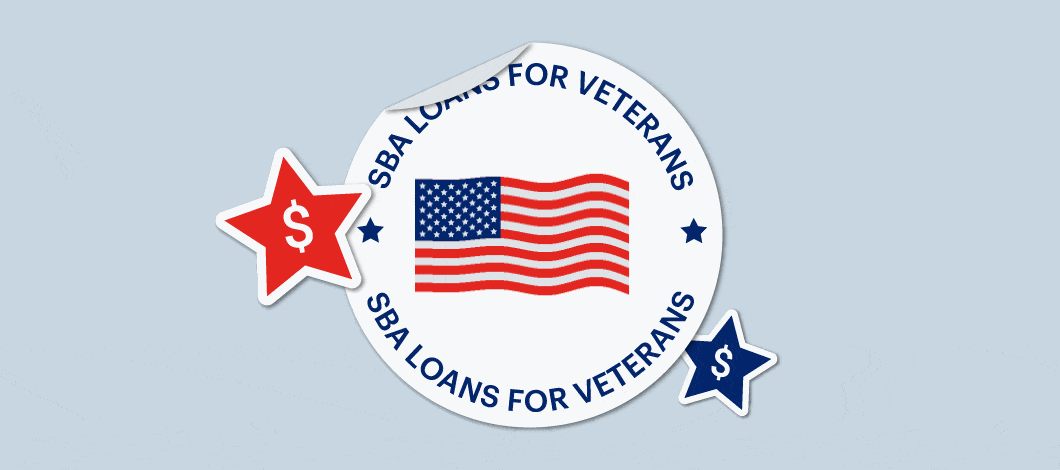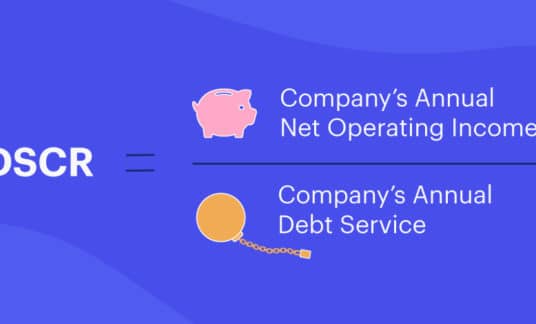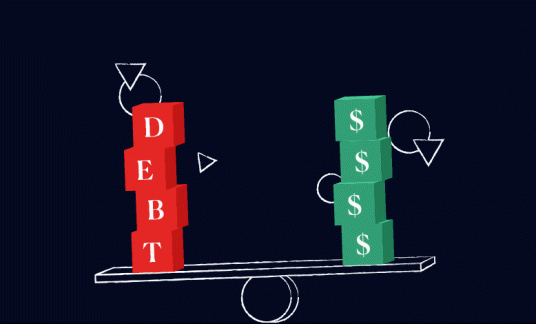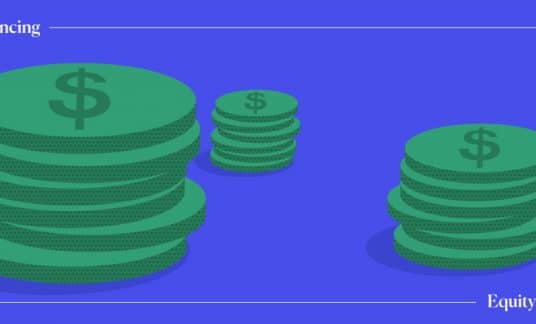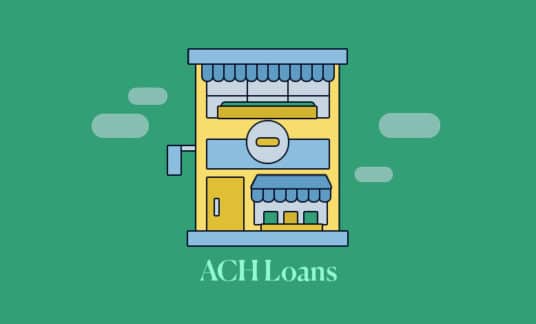When U.S. military veterans transition to civilian life, they bring a host of skills and experiences that are highly valuable to the business community. Indeed, former members of the military have a long history of entrepreneurism. Small Business Administration (SBA) loans for veterans have been one of the primary tools for service members to fund a business.
In the past, the Department of Veterans Affairs (VA) and the SBA have teamed up to make low-interest loans available for veterans who otherwise might not be able to get financing for their businesses.
Note that these programs are approved for set periods and then are renewed or left to expire. As a result, the availability of SBA loans for veterans can change.
Are There SBA Loans for Veterans?
Yes, there are SBA loans for veterans (as well as other resources to assist veteran entrepreneurs). Though veteran entrepreneurs can be considered for most SBA loans, currently, the Military Reservist Economic Injury Disaster Loan (MREIDL) program is the only veteran-specific loan option offered by the SBA.
The MREIDL program can provide financial support to veteran business owners who are recalled to deploy. It can also help veteran (as well as nonveteran) business owners who’ve hired active service members or military reservists.
The purpose of the MREIDL program is to help small businesses meet their regular and necessary operating expenses during a disaster or situations of hardship. MREIDL only can be used for working capital and isn’t intended to replace profits.
The interest rate on MREIDL loans can be no more than 4% a year, with a maximum of 30 years of maturity. Additionally, there are no prepayment penalties or fees. Small businesses can borrow up to $2 million under this program, but collateral is required for loans exceeding $50,000.
-
What Is an SBA Loan?
The SBA doesn’t lend money. The agency guarantees the majority of the loan, thereby lowering a lender’s risk and making the financing provider more likely to fund a small business. The SBA also offers favorable interest rates and other benefits, including educational resources.
The SBA’s loan programs provide lending opportunities to underserved entrepreneurs, including military veterans, minorities and women. Learn more about SBA loans here.
Other SBA Loans Available to Veterans
U.S. military veterans also may qualify for these SBA programs, though they’re not exclusive to them:
- 7(a) Loans
- SBA Express
- 504 Loans
- Community Advantage Loans
- Microloans
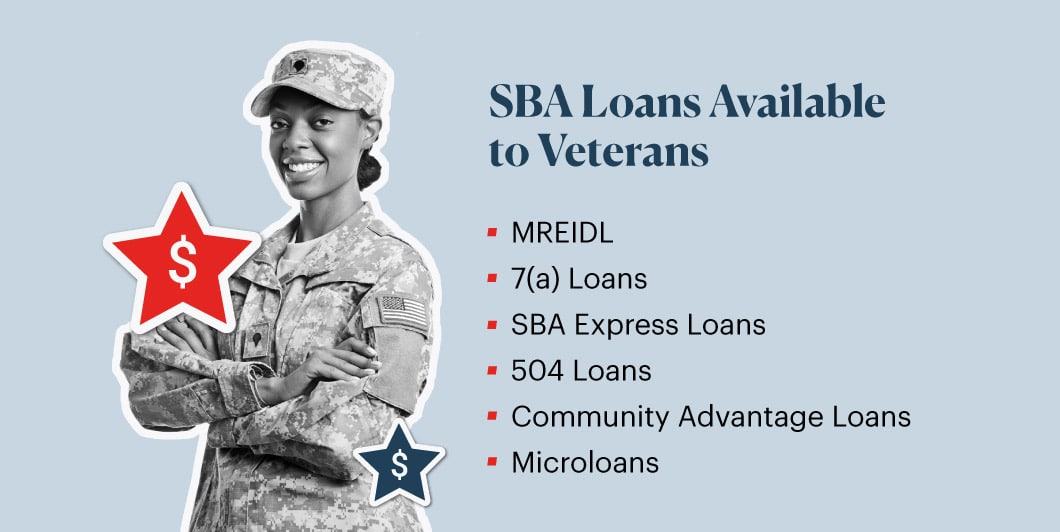
SBA Standard 7(a) Loan Program
SBA standard 7(a) loans, available to both veterans and nonveterans, have several uses, including equipment financing, working capital, debt refinancing or seasonal lines of credit.
The maximum loan amount is $5 million. The SBA caps interest rates for 7(a) loans. Rates may be fixed or variable. Terms vary based on the purpose of the loan, but are typically up to 25 years for real estate and 10 years for working capital or fixed assets. Keep in mind this program has a longer turnaround time than Express loans.
SBA Express Loan Program
SBA Express loans can help veterans and nonveterans alike. Business owners can borrow up to $500,000 through the SBA Express program (permanently increased from $350,000 as of October 1, 2020). Additionally, for all SBA Express loans made to veteran-owned small businesses, the upfront guaranty fee is waived. In contrast, for most other SBA loans, the upfront guaranty fee depends on the loan amount and maturity.
The SBA will respond to applications within 36 hours, compared to 5-10 business days for standard 7(a) loans, cutting the entire funding process to 45-60 days. Interestingly, of all SBA loans for which veterans are approved, nearly three-quarters are $350,000 or less.
SBA Express loans for veteran entrepreneurs and other business owners can be used for several different business purposes beyond startup costs. If you qualify, you can use this loan to expand your business, purchase new equipment, obtain working capital or purchase real estate.
While SBA Express loans typically have low interest rates, borrowers can negotiate. Interest rates can’t exceed the maximum SBA interest loan rate, which can vary depending on the loan amount, term and the prime rate.
If you’re a veteran who is considering beginning or expanding your international export business, an Export Express loan may be the better choice.
Both types of Express loans are subsets of the SBA 7(a) loan program.
-
Regarding SBA Guaranty Fees
An SBA guaranty fee is a percentage of the SBA-guaranteed amount of your loan. First, the SBA charges lenders a guaranty fee for helping back a loan. Typically, lenders then pass this cost onto you, the borrower.
The guaranty fee is often incorporated into the total cost of a loan, so it isn’t always an upfront expense. Learn how SBA guaranty fees work here.
SBA 504 Loan Program
SBA 504 loans must be used for fixed assets or the refinancing of debt tied to them. Depending on the type of project, the maximum loan amount for the 504 program ranges from $5 million to $5.5 million. This is ideal for larger, capital-intensive projects, but you must meet specific job-creation goals.
The 504 loans are provided through Certified Development Companies (CDCs), which are licensed by the SBA.
There is a program many CDCs participate in, known as VetLoan Advantage. The National Association of Development Companies (NADCO) created the VetLoan Advantage initiative to offer discounts to veteran businesses who are approved for SBA 504 loans. Under the VetLoan Advantage program, each participating CDC creates its fee waivers and discounts for eligible small business owners. Ownership and eligibility requirements vary, so it’s best to reach out to a CDC directly.
SBA Community Advantage Program
This program is designed to provide funding to entrepreneurs in underserved communities, including veteran, women and minority small business owners. Under the Community Advantage program, loans up to $250,000 are available. Funds can be used to purchase real estate, equipment or inventory or for working capital. Terms are 10 years for working capital loans and 25 years for real estate loans. Collateral is negotiable.
SBA Microloan Program
Microloans are designed for startup veteran business owners, those with limited collateral or those experiencing cash-flow challenges. Borrowers can apply for up to $50,000 in working capital under this program, though loans as low as $500 are also available. Interest rates are negotiated between the borrower and lender, not to exceed interest rate limits set by the SBA. Additionally, terms are negotiated by the lender. There are no prepayment penalties.
-
Alternatives to SBA Loans for Veterans
If you’re a military veteran in search of business loans, there are a number of other financing options for which you might qualify. If you’ve been in business for a couple years and have a high credit score, you might consider a loan from a conventional lender, such as a bank or credit union. If your credit score has seen better days, don’t have a lot of time in business and need funds fast, an alternative lender could be a better option.
Other financing options veteran-owned businesses could qualify for include:
Get a decision fast.
SBA Loans and Resources for Veterans FAQs
What Are the SBA Veterans Advantage Program and Patriot Express Program?
These loan programs for veterans are no longer available, having ended between 2018 and 2020, according to an SBA official. The SBA Patriot Express loan program began as a pilot initiative in 2007 and offered streamlined paperwork and an enhanced guaranty. The Veterans Advantage program offered fee reductions for eligible active or former military service members applying for SBA Express loans.
Are There SBA Loans for Disabled Veterans, Minority Veterans or Female Veterans?
There are no SBA loans specifically for disabled, minority or female veterans, though the Community Advantage loan program is designed to provide small business financing to entrepreneurs in underserved communities.
That said, there are other resources designed for disabled, minority and female veterans, including the following:
Vets First Verification Program
Through the VA’s Vets First Verification Program (also referred to as the Veterans First Contracting Program), service-disabled veteran business owners as well as other veteran entrepreneurs can compete for VA set-aside contracts.
Service-Disabled Veteran Entrepreneurship Training Program
Under this program, service-disabled veterans can access entrepreneurial resources and training to help them start or grow a small business.
Women Veteran Entrepreneurship Training Program
Online and in-person workshops are offered by SBA partners to women veterans and service members and their spouses.
Are There VA Small Business Loans and Grants Available?
No, the VA does not offer small business loans or grants. As such, there are no VA business loan requirements.
What Other SBA Veteran Resources Are Available?
Veteran entrepreneurs can access free counseling through the Veterans Business Outreach Center (VBOC) program. Additionally, the program offers assistance and resources to veterans interested in starting or growing a small business, including mentorship, concept assessments and workshops.
The SBA also offers entrepreneurial training to veterans through its Boots to Business programs.
Additionally, these SBA partners provide training, mentoring and tools for small business owners:
What If I Still Have Questions?
To learn more about how the SBA helps veteran-owned businesses, including through funding and training programs, contact your nearest Office of Veterans Business Development (OVBD)



